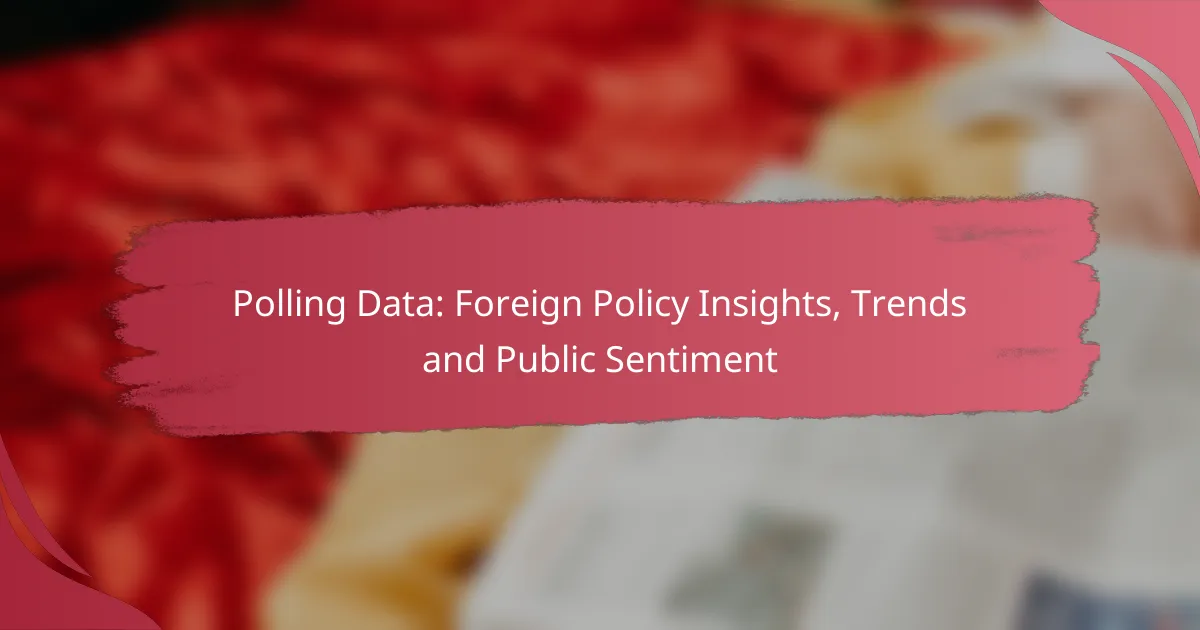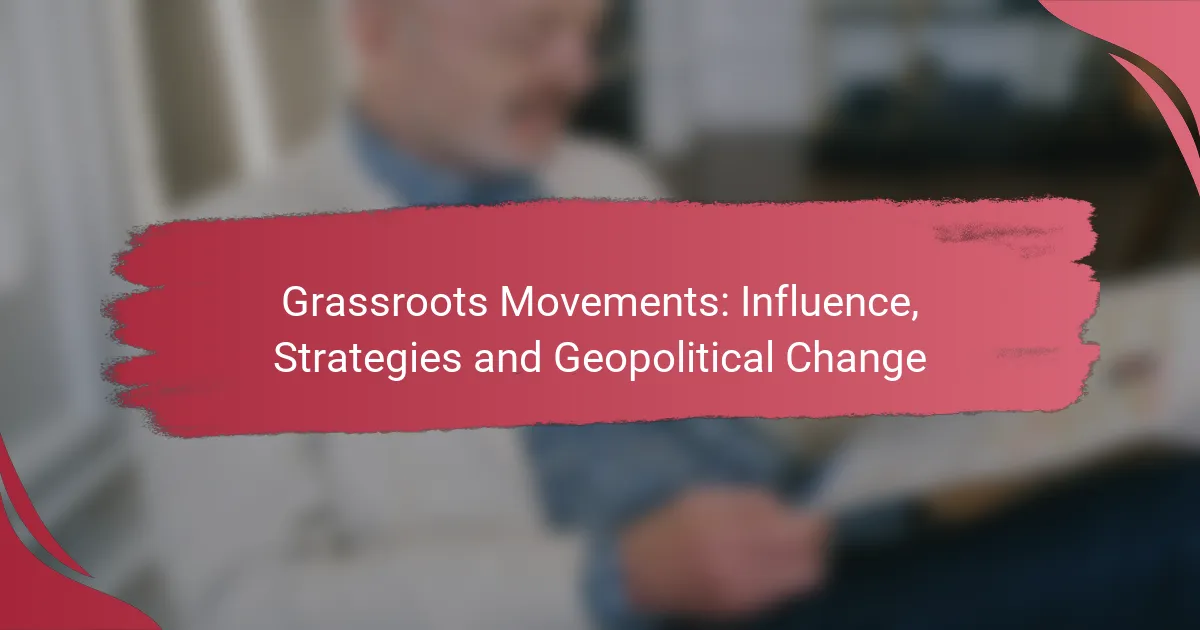Polling data on foreign policy reveals a notable shift in public sentiment, emphasizing multilateralism, climate change, and human rights. This evolving perspective significantly influences policymakers, guiding their decisions on international relations and diplomatic strategies. As citizens express their views, these sentiments can reshape legislation and impact the overall direction of U.S. foreign policy.
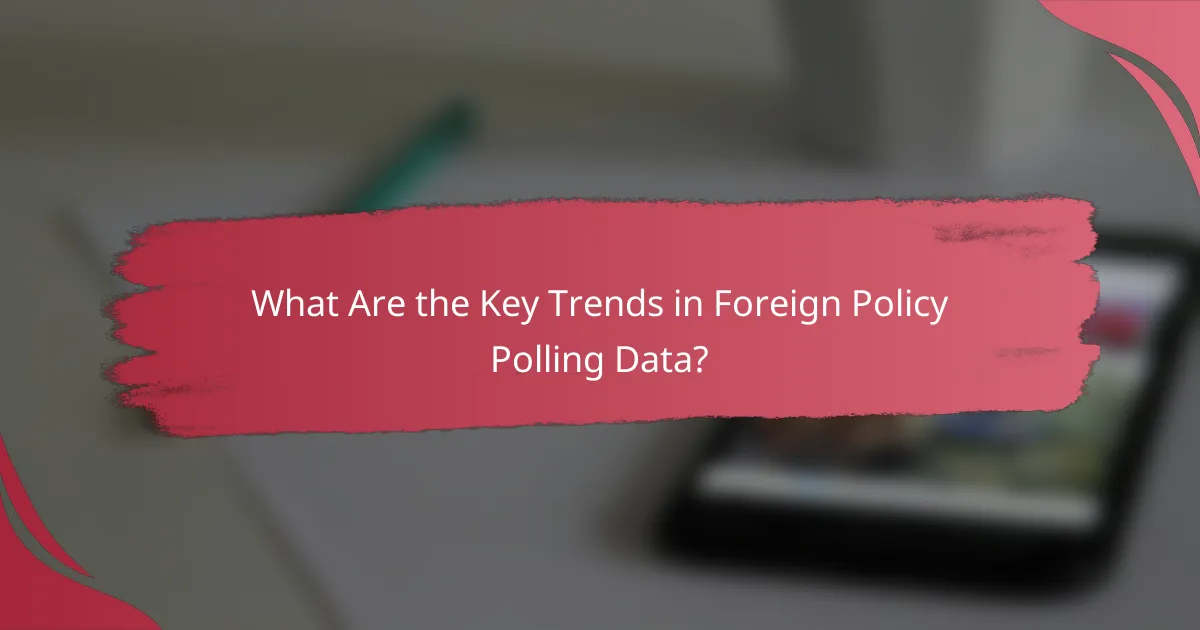
What Are the Key Trends in Foreign Policy Polling Data?
Key trends in foreign policy polling data reveal a significant shift in public sentiment towards multilateral approaches, increased concern about climate change, skepticism regarding military interventions, a focus on economic diplomacy, and a heightened emphasis on human rights issues. These trends reflect evolving priorities among citizens and can influence policymakers in shaping future foreign relations.
Shift towards multilateralism
The trend towards multilateralism indicates a growing preference for collaborative international efforts rather than unilateral actions by individual nations. Polls show that many citizens believe global challenges, such as pandemics and trade disputes, require cooperative solutions involving multiple countries.
For example, recent surveys indicate that a majority of respondents support international agreements on issues like climate change and public health. This shift suggests that citizens are increasingly valuing diplomacy and partnerships over isolationist policies.
Increased public concern over climate change
Public concern about climate change has surged in recent years, influencing foreign policy discussions. Many polls indicate that a significant portion of the population views climate action as a top priority for government leaders, impacting international negotiations and agreements.
As a result, countries are pressured to adopt sustainable practices and collaborate on global initiatives. This trend is evident in the growing support for international climate accords, with citizens advocating for stronger commitments from their governments.
Growing skepticism of military interventions
There is a notable increase in skepticism regarding military interventions among the public. Many citizens now question the effectiveness and consequences of military action, leading to a preference for diplomatic solutions.
Polling data suggests that a substantial number of people believe that military interventions often lead to prolonged conflicts without achieving desired outcomes. This skepticism is prompting policymakers to consider alternative strategies, such as negotiation and conflict resolution, over military engagement.
Rising importance of economic diplomacy
Economic diplomacy is becoming increasingly important in foreign policy discussions, with many citizens recognizing its potential to foster international relations. Polls indicate that people value trade agreements and economic partnerships as tools for enhancing national security and global stability.
Countries are now more likely to engage in economic diplomacy to address issues such as trade imbalances and economic sanctions. This trend highlights the need for policymakers to prioritize economic ties in their foreign relations strategies.
Focus on human rights issues
Human rights issues are gaining prominence in foreign policy polling data, with citizens expressing strong support for the promotion and protection of human rights globally. Many polls reveal that people expect their governments to take a stand against human rights abuses in other countries.
This focus on human rights is influencing diplomatic relations, as citizens advocate for policies that hold governments accountable for violations. As a result, human rights considerations are increasingly integrated into foreign policy decisions and international agreements.
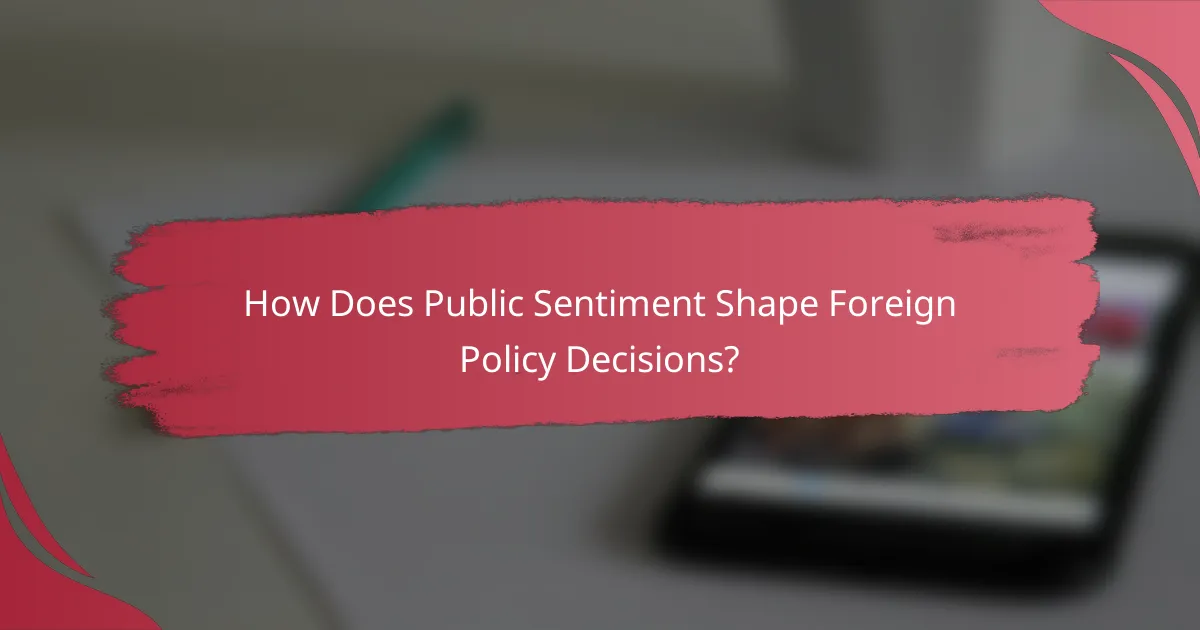
How Does Public Sentiment Shape Foreign Policy Decisions?
Public sentiment significantly influences foreign policy decisions by guiding lawmakers and leaders on what actions to take or avoid. When citizens express strong opinions on international issues, these sentiments can lead to changes in legislation, impact presidential approval ratings, and shape diplomatic strategies.
Influence on legislative actions
Legislators often respond to public sentiment when crafting foreign policy legislation. For instance, if a majority of constituents oppose military intervention, representatives may be less likely to support such measures. This responsiveness can lead to delays or alterations in proposed policies, as lawmakers seek to align with the views of their electorate.
Polling data can provide insights into public opinion trends, helping legislators gauge the potential support or backlash for specific foreign policy initiatives. Engaging with constituents through town halls or surveys can further inform their decisions and enhance democratic accountability.
Impact on presidential approval ratings
Presidential approval ratings are closely tied to public sentiment regarding foreign policy. When a president takes actions that resonate positively with the public, such as successful diplomatic negotiations, approval ratings can rise significantly. Conversely, unpopular military actions or perceived failures in international relations can lead to a sharp decline in support.
For example, a president who effectively addresses a humanitarian crisis may see a boost in approval, while a controversial military engagement could result in disapproval ratings in the low to mid-forties. Understanding these dynamics is crucial for any administration aiming to maintain public support.
Role in shaping diplomatic strategies
Public sentiment plays a vital role in shaping a country’s diplomatic strategies. Leaders often consider how their actions will be perceived domestically, as public support can enhance or hinder their ability to negotiate effectively on the global stage. For instance, a government facing significant public opposition to a trade deal may choose to delay negotiations until sentiment shifts.
Additionally, leaders may leverage positive public sentiment to strengthen their negotiating position. By showcasing domestic support for a particular approach, they can present a united front in international discussions, making it easier to achieve favorable outcomes. Monitoring public opinion through polls and focus groups is essential for adapting diplomatic strategies accordingly.
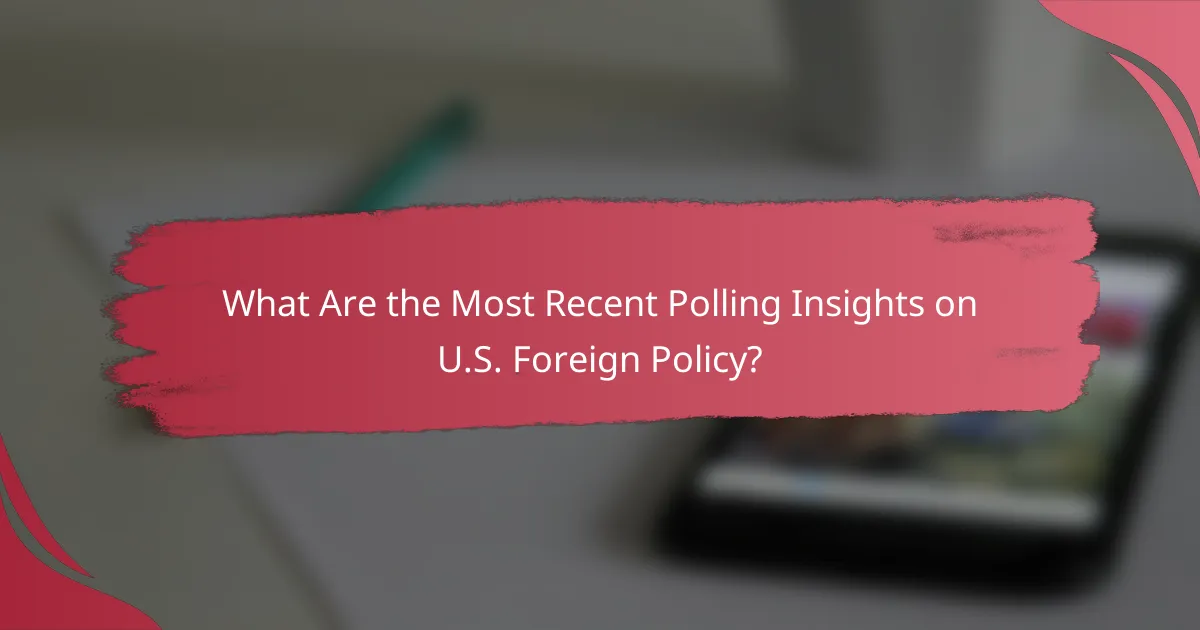
What Are the Most Recent Polling Insights on U.S. Foreign Policy?
Recent polling data indicates that U.S. foreign policy is increasingly shaped by public sentiment regarding international relations, particularly with major powers like China and alliances such as NATO. Understanding these insights can help policymakers align their strategies with the views of the American public.
Public opinion on China relations
Public opinion on U.S.-China relations is complex, with many Americans expressing concerns about economic competition and human rights issues. Polls show that a significant portion of the population favors a tough stance on China, particularly regarding trade practices and military presence in the Asia-Pacific region.
However, there is also a recognition of the importance of diplomatic engagement. Many believe that while competition is necessary, maintaining open lines of communication is crucial for global stability. This duality reflects a nuanced understanding of the challenges posed by China.
Views on NATO and military alliances
Support for NATO remains strong among the American public, with many viewing the alliance as essential for collective security. Recent surveys indicate that a majority of Americans believe that U.S. involvement in NATO strengthens national security and deters aggression from adversaries.
Nonetheless, there are concerns about the financial contributions of the U.S. to NATO. Some citizens feel that European allies should increase their defense spending to share the burden more equitably. This sentiment highlights the ongoing debate about the balance of responsibilities within military alliances.
Perceptions of U.S. global leadership
Perceptions of U.S. global leadership are mixed, with many Americans expressing pride in the country’s role as a world leader while also questioning its effectiveness in addressing global challenges. Polls suggest that while a majority support active engagement in international affairs, there is skepticism about the outcomes of past interventions.
To enhance its global standing, the U.S. may need to focus on multilateral cooperation and address domestic priorities that resonate with the public. This approach could help rebuild trust in U.S. leadership and foster a more favorable view of its role on the world stage.
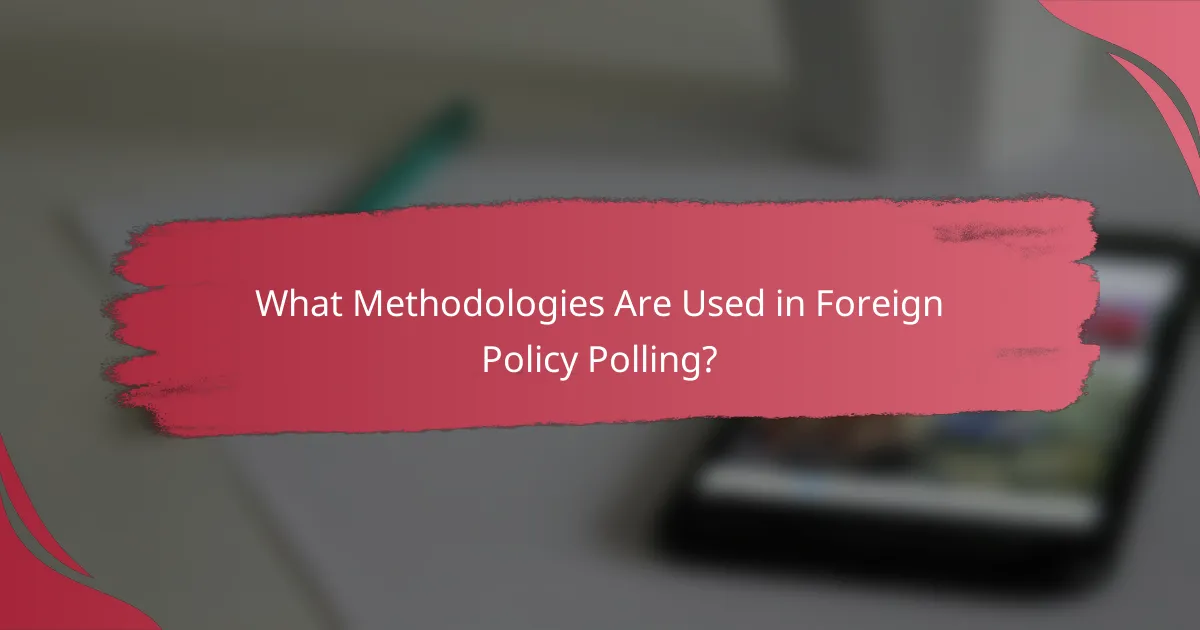
What Methodologies Are Used in Foreign Policy Polling?
Foreign policy polling employs various methodologies to gauge public sentiment and insights effectively. The most common methods include online surveys, telephone interviews, and focus groups, each offering unique advantages and challenges in data collection.
Online surveys
Online surveys are a popular method for collecting foreign policy opinions due to their cost-effectiveness and speed. They allow researchers to reach a broad audience quickly, often yielding responses from thousands of participants in a matter of days.
However, it’s essential to ensure that the sample is representative of the population to avoid bias. Researchers should consider factors like demographic diversity and internet accessibility when designing these surveys.
Telephone interviews
Telephone interviews provide a more personal touch, allowing for in-depth conversations that can uncover nuanced opinions on foreign policy. This method can be particularly effective in reaching demographics that may not engage with online surveys.
While telephone interviews can yield rich qualitative data, they are often more time-consuming and expensive. Researchers should be aware of the potential for lower response rates and the need for skilled interviewers to facilitate discussions.
Focus groups
Focus groups involve small groups of participants discussing foreign policy topics guided by a moderator. This method is valuable for exploring complex issues and understanding the reasoning behind public sentiments.
Although focus groups can provide deep insights, they are not statistically representative and should be used to complement other polling methods. Researchers should aim for diversity in group composition to capture a range of perspectives and avoid groupthink.
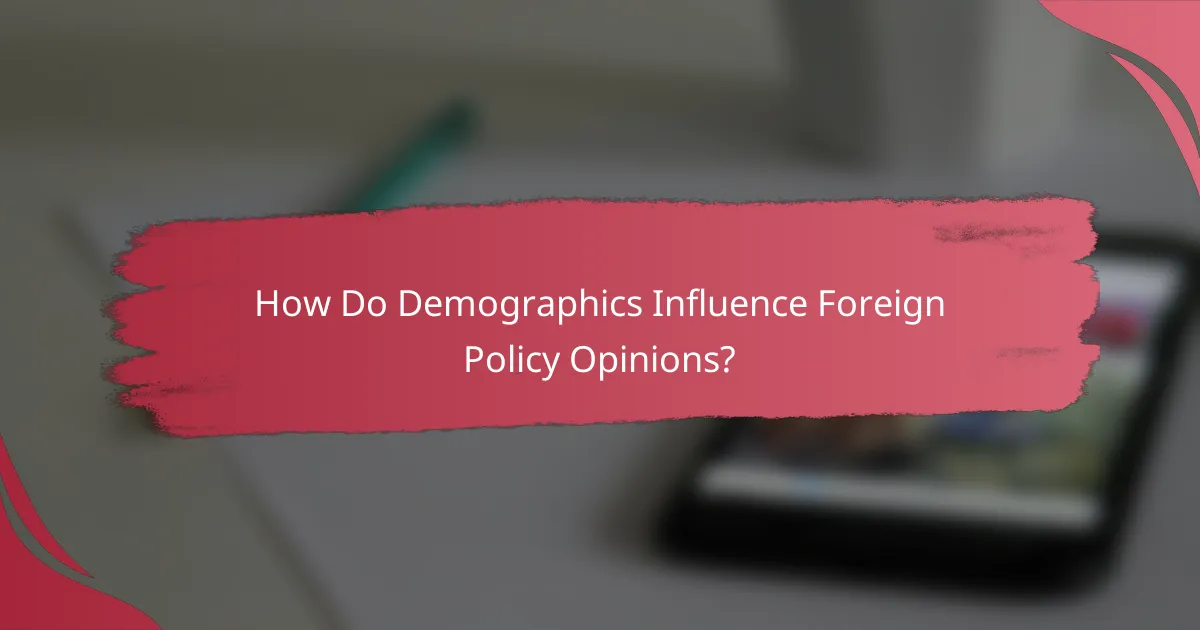
How Do Demographics Influence Foreign Policy Opinions?
Demographics significantly shape foreign policy opinions, affecting how different groups perceive international issues. Factors such as age, education, and socioeconomic status play crucial roles in determining public sentiment and attitudes toward foreign relations.
Age-related differences
Age is a key demographic factor that influences foreign policy opinions. Younger individuals often prioritize global issues like climate change and human rights, while older generations may focus more on national security and economic stability. This divergence can lead to varying support for specific policies and international agreements.
For example, surveys indicate that younger voters are more likely to support multilateralism and international cooperation, whereas older voters may prefer a more isolationist approach. Understanding these age-related differences can help policymakers tailor their messages and strategies to resonate with distinct age groups.
When engaging with different age demographics, consider using platforms and communication styles that appeal to each group. For instance, social media campaigns may be effective for younger audiences, while traditional media might better reach older individuals. This targeted approach can enhance public engagement and support for foreign policy initiatives.
